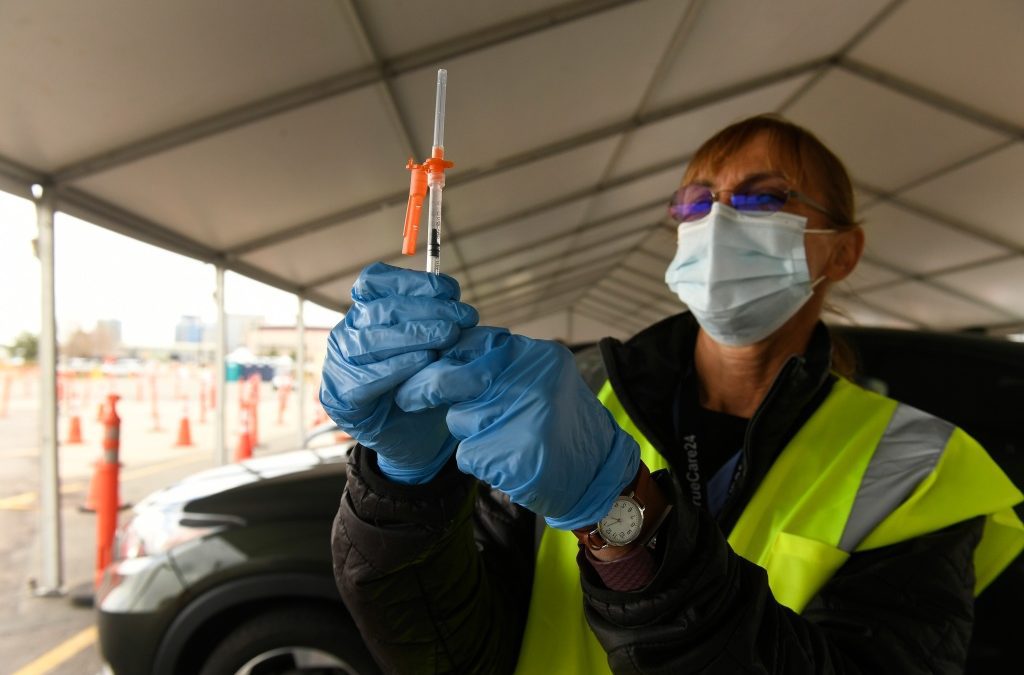Colorado is redirecting the flow of certain COVID-19 treatments and opening new large-scale sites that offer both testing and vaccinations in anticipation of the virus’s omicron variant taking off.
Omicron accounted for 9.76% of new COVID-19 cases in Colorado in the week of Dec. 12 — an 18-fold increase from two weeks earlier. In comparison, the delta variant increased its share by about eight-fold in its first two weeks on the state’s radar.
While the delta variant still accounts for the majority of cases in Colorado, state public health officials are preparing for omicron to take over at some point, Gov. Jared Polis said at a news conference Tuesday.
“We expect to see omicron increase even as we see delta decrease, which is what we have been seeing,” he said.
Colorado is coming off its fifth COVID-19 wave of the pandemic, a surge that was dominated by delta and peaked shortly before Thanksgiving. Hospitalizations continued to drop on Tuesday, with 1,030 people receiving care statewide for confirmed COVID-19 as of early afternoon.
The percentage of tests coming back positive increased, however, and cases have started to rise again, state epidemiologist Dr. Rachel Herlihy said. Typically, the positivity rate rises first, with cases, hospitalizations and deaths following in the days and weeks afterward, she said.
It generally takes one to two weeks after a person is tested for COVID-19 to determine which variant is responsible with certainty, Herlihy said. But the state can get a rough picture by looking at how many tests flagged that a sample of the virus is missing the “S gene” — something that doesn’t require full sequencing, she said. Delta, which is the only variant other than omicron with a meaningful presence in Colorado, has the S gene.
State officials also are monitoring where the positivity rate and cases have started to rise again, which provides a clue to where omicron is spreading because delta is in retreat now, Herlihy said. Cases are spiking in mountain communities that are popular with tourists, and there’s some sign that spread may be increasing in the Denver area, she said.
The state has started redirecting antibody treatments based on where omicron appears to be competing with delta, Polis said. Two of the three main options for monoclonal antibody treatment don’t appear to work well against omicron, making it important to send the one treatment that does to places where the variant is more common. Monoclonal antibodies are lab-created versions of substances the body produces to fight the virus, and can reduce the odds that high-risk people will be hospitalized.
Right now, the state has more appointments for monoclonal antibodies available than people signing up for them, Polis said. Anyone who is at elevated risk for severe illness because of age or chronic conditions is eligible if they have a confirmed COVID-19 diagnosis, developed symptoms less than 10 days earlier and have mild or moderate illness. If they’re sick enough to need hospital care, it’s too late.
The state is also opening new sites offering both vaccines and testing along the Front Range, Polis said. Information about the new sites’ hours wasn’t yet available on Tuesday afternoon.
The existing walk-up and drive-thru mass vaccination sites will remain in place, as will the current testing-only sites.
The new combined sites open “soon” and will be at:
- Ball Arena, Denver
- Dick’s Sporting Goods Park, Commerce City
- Water World, Federal Heights
- Kunsmiller Creative Arts Academy, Denver
- Boulder County Fairgrounds, Longmont
- Timberline Church, Fort Collins
The antibodies the immune system produces after vaccination or a previous infection have a harder time halting the omicron variant than they did with previous versions of the virus. While other parts of the immune response will kick in and generally prevent severe illness, a booster shot increases antibody levels and gives them a somewhat better shot at stopping infection altogether.
Polis urged anyone who is eligible to get a third dose of the vaccine to get one, and said about 48% of vaccinated Coloradans who are eligible have done so. Anyone who received their second Pfizer or Moderna dose at least six months ago is eligible. So are people who got the single-dose Johnson & Johnson vaccine at least two months ago.
“We need to stop thinking of it as an optional third dose,” he said. “Many vaccinations require three doses.”
This content was originally published here.

